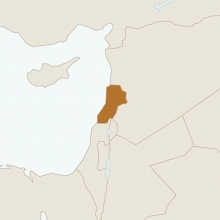
NDI
With little over a month to go before Lebanon’s first national vote in nine years, experts are gauging the pulse of the electorate, tuning in to elements including turnout, understanding of voting procedures and other factors that can swing a seat….IPSOS Marketing found 65 percent of interviewees did not believe elections would bring about change, The Daily Star (Lebanon) reports:
Voters’ perceptions were also weighted by a second poll conducted by the National Democratic Institute, a U.S.-based organization with a branch in Lebanon, between December 2017 and January 2018.
According to the poll, corruption came in third place among issues that voters wanted to see improved – right after health care and job creation. …Polls conducted by NDI [a core institute of the National Endowment for Democracy] found the number of respondents saying they were “very likely” to vote was highest among those over 70 years old (67.4 percent) and lowest was among 21-29 year olds (41.2 percent).

MEI
Lebanon’s Shi’ite Hezbollah movement expects its allies to win more seats in a parliamentary election in May but does not expect any fundamental change in the balance of power in the government, Reuters adds.
Lebanese parties are gearing up for the coming popular vote, with many fearing that the new electoral system that is based on proportional representation across 15 electoral districts might fragment their representation. Even Hezbollah seems wary of the parliamentary outcome, with experts believing the group may be facing challenges in several districts, notes Al-Monitor.
Hezbollah’s election campaign heavily relies on fear-mongering about the possibility of a war with Israel. Hezbollah needs representation in Parliament and Cabinet in order to defend the resistance, the group’s leader Sayyed Hasan Nasrallah said Monday night
 With a parliamentary system and regular presidential elections, Lebanon has the trappings of a democracy, but politics are dominated by former warlords and family dynasties that have long used the country’s sectarian-based power-sharing system to perpetuate corruption and nepotism, and the Hezbollah militia is very powerful, notes a recent AP analysis:
With a parliamentary system and regular presidential elections, Lebanon has the trappings of a democracy, but politics are dominated by former warlords and family dynasties that have long used the country’s sectarian-based power-sharing system to perpetuate corruption and nepotism, and the Hezbollah militia is very powerful, notes a recent AP analysis:
All senior government positions are allocated according to sect, including the head of state, who should be a Christian, the prime minister, a Sunni Muslim, and the parliament speaker, a Shiite. The formula is based on outdated demographic data and does not account for hundreds of thousands of Palestinians who are denied citizenship and a vote. There hasn’t been a parliament election since 2009, and lawmakers have unconstitutionally extended their terms. Lebanon has also been letting press freedoms slide, summoning talk show hosts to court and sentencing an analyst to jail for critical comments about the army.

ADL
Hezbollah in recent years has appeared disinclined to foment domestic unrest that could draw key manpower and resources away from its activities in neighboring Syria, according to a recent analysis from the Congressional Research Service. But Lebanon may be reemerging as an arena for competition and potential conflict between regional rivals, adds Carla E. Humud , CRS Analyst in Middle Eastern Affairs.
Hezbollah appears unlikely to lose its status as a powerful, armed nonstate actor with a dominant place in the Lebanese political order anytime soon, according to Thanassis Cambanis, a Senior Fellow at the Century Foundation.
 Iranian sponsorship gives Hezbollah Tehran’s most significant non-state ally – a decisive edge over other political actors.
Iranian sponsorship gives Hezbollah Tehran’s most significant non-state ally – a decisive edge over other political actors.
Iran’s backing contributed markedly to the group’s rapid emergence during the 1980s as one of the world’s premier armed non-state actors by providing resources and sanctuary, analysts suggest. But Hezbollah’s success also drew on characteristics endogenous to the organization itself, such as their decision-making processes and members’ backgrounds.
Hezbollah’s status as a non-state actor is beneficial to the Party because it exempts it from international obligations and restrictions that are imposed upon states and their conducts of foreign policy or military operations, notes analyst Nima Khorrami Assl.







